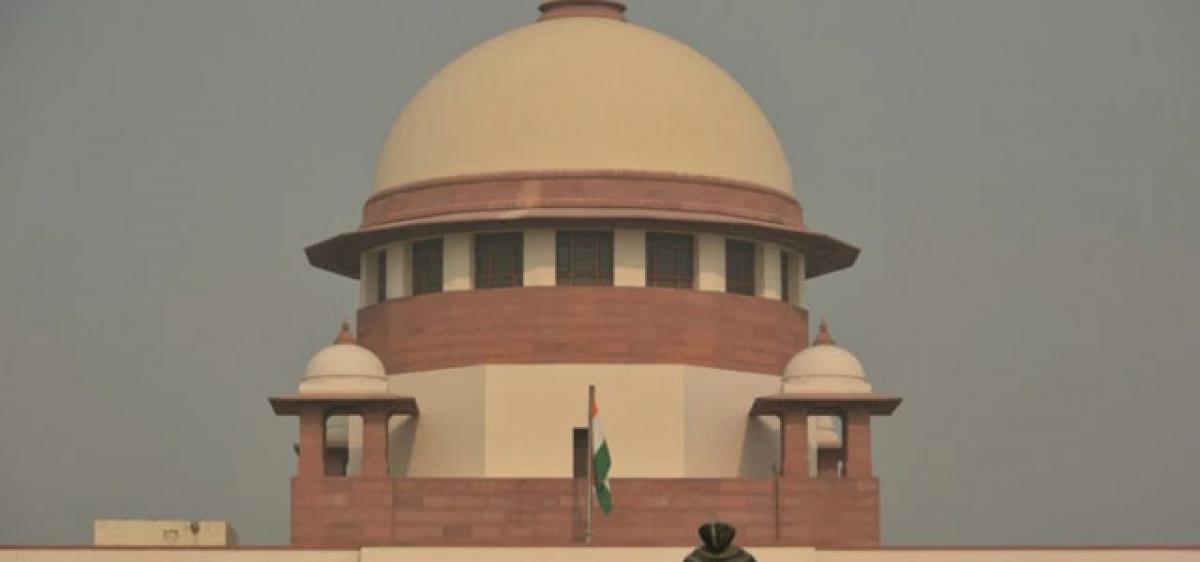Live
- BJP releases ‘charge sheet’ against BJD govt
- District Nodal Officer Venkataramana announced the intermediate results
- She team that stopped child marriages
- Medical devices sector needs separate rules, says industry body AiMeD
- Andhra Paper declares lockout
- Opposition INDIA bloc working on 'one year, one PM' formula: PM Modi
- Delhi HC quashes FIR for outraging woman's modesty, orders man to assist Traffic Police for a month as settlement
- 'Apologise to families of farmers who committed suicide in Vidarbha', Amit Shah dares Sharad Pawar
- SC Collegium recommends appointment of a permanent judge in Chhattisgarh HC, extension of term of two judges
- U20 Men's football nationals: Telangana, Sikkim earn full points with easy win
Just In

The Telangana government’s latest move to increase the overall quantum of reservations over and above the 50 per cent limit can hit legal road blocks. The Supreme Court in the Indra Sawhney case articulated that balancing various provisions of the Constitution meant that total quotas could not cross 50 per cent in any given year.
The Telangana government’s latest move to increase the overall quantum of reservations over and above the 50 per cent limit can hit legal road blocks. The Supreme Court in the Indra Sawhney case articulated that balancing various provisions of the Constitution meant that total quotas could not cross 50 per cent in any given year.
The rationale for imposing 50 per cent rule is based on the relationship between affirmative action in the form of protective discrimination and the equality provisions of Constitution. This is to ensure a fine balance among competing Constitutional principles of formal equality, social justice and efficiency.
Constitution permits reservations as being an exception to the principle of right to equality. Since the exception cannot be greater than the rule, the reservations cannot exceed 50 per cent. It is wrong to read the reservation provisions of the Constitution as independent of or superior to equality provisions. Thus reservation provisions cannot limit the equality provisions.
Article 335 of the Constitution balances its vision of social justice in the form of reservations with the objective of maintaining efficiency of public administration. The limit of 50 per cent on the total reservations is placed to ensure this balance between what seems to be mutually contradictory yet complementary Constitutional provisions.
Any form of protective discrimination in the form of reservations may promote social justice but would have an adverse impact on merit and efficiency which is also a Constitutional vision. Therefore, it is imperative to ensure that one Constitutional provision does not dominate the other.
Reservations cannot be opposed on the ground of merit or efficiency as Constitution itself allows such positive discrimination in favour of unequals. However, it is equally erroneous to frame a policy of affirmative action through protective discrimination completely undermining the principles of merit and efficiency.
Thus, the 50 per cent Lakshmana Rekha is socially justified and constitutionally valid.
The Constitutional provisions that enable the state to provide reservations for certain classes are special provisions as enunciated in the said articles itself. In M R Balaji verdict, the Constitutional bench of the Supreme Court held that special provision must be within reasonable limits.
The 69 per cent quota is justified on the ground that backward sections constitute 90 per cent of state’s population. But, the apex court in Indra Sawhney case stated that the special provisions contemplating reservations only “speaks of adequate representation and not proportionate representation.”
The reference to North Eastern states is also irrational. The apex court said, “While 50 per cent shall be the rule, it is necessary not to put out of consideration certain extraordinary situations inherent in the great diversity of this country and the people.
It might happen that in far-flung and remote areas the population inhabiting those areas might, on account of their being out of the mainstream of national life and in view of conditions peculiar to and characteristical to them, need to be treated in a different way. A special case has to be made out.” No such special case can be made out for Telangana.

© 2024 Hyderabad Media House Limited/The Hans India. All rights reserved. Powered by hocalwire.com







